

Transtheistic. Transtheistic is a term coined by philosopher Paul Tillich or Indologist Heinrich Zimmer, referring to a system of thought or religious philosophy which is neither theistic, nor atheistic,[1] but is beyond them.
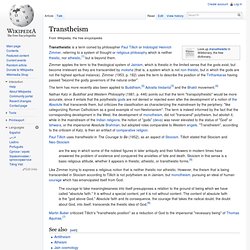
The term has more recently also been applied to Buddhism,[2] Advaita Vedanta[3] and the Bhakti movement.[4] Paul Tillich uses transtheistic in The Courage to Be (1952), as an aspect of Stoicism. Tillich stated that Stoicism and Neo-Stoicism are the way in which some of the noblest figures in later antiquity and their followers in modern times have answered the problem of existence and conquered the anxieties of fate and death.
Stoicism in this sense is a basic religious attitude, whether it appears in theistic, atheistic, or transtheistic forms.[5] Like Zimmer trying to express a religious notion that is neither theistic nor atheistic. The courage to take meaninglessness into itself presupposes a relation to the ground of being which we have called "absolute faith. " See also[edit] Theism. Pantheism. Pantheism is the belief that the universe (or nature as the totality of everything) is identical with divinity,[1] or that everything composes an all-encompassing, immanent God.[2] Pantheists thus do not believe in a distinct personal or anthropomorphic god.[3] Some Eastern religions are considered to be pantheistically inclined.
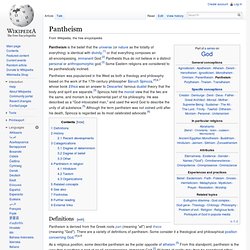
Definitions[edit] Pantheism is derived from the Greek roots pan (meaning "all") and theos (meaning "God"). There are a variety of definitions of pantheism. Some consider it a theological and philosophical position concerning God.[4]:p.8. Panentheism. Panentheism (from Greek πᾶν (pân) "all"; ἐν (en) "in"; and θεός (theós) "God"; "all-in-God") is a belief system which posits that the divine (be it a monotheistic God, polytheistic gods, or an eternal cosmic animating force[1]) interpenetrates every part of nature and timelessly extends beyond it.
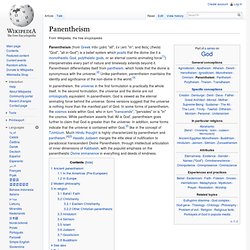
Panentheism differentiates itself from pantheism, which holds that the divine is synonymous with the universe.[2] Unlike pantheism, panentheism maintains the identity and significance of the non-divine in the world.[3] Ancient panentheism[edit] In the Americas (Pre-European)[edit] According to Charles C. Mann's, "1491", only the lower classes of Aztec society were polytheistic. Monolatrism. Henotheism. Henotheism (Greek εἷς θεός heis theos "one god") is the belief in and worship of a single God while accepting the existence or possible existence of other deities that may also be worshipped.
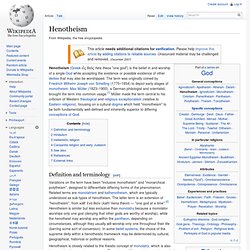
The term was originally coined by Friedrich Wilhelm Joseph von Schelling (1775–1854) to depict early stages of monotheism. Max Müller (1823–1900), a German philologist and orientalist, brought the term into common usage.[1] Müller made the term central to his criticism of Western theological and religious exceptionalism (relative to Eastern religions), focusing on a cultural dogma which held "monotheism" to be both fundamentally well-defined and inherently superior to differing conceptions of God.
Deism. Deism ( i/ˈdiː.ɪzəm/[1][2] or /ˈdeɪ.ɪzəm/) is the belief that reason and observation of the natural world are sufficient to determine the existence of a Creator, accompanied with the rejection of revelation and authority as a source of religious knowledge.[3][4][5][6][7] Deism gained prominence in the 17th and 18th centuries during the Age of Enlightenment—especially in Britain, France, Germany, and the United States—among intellectuals raised as Christians who believed in one god, but found fault with organized religion and did not believe in supernatural events such as miracles, the inerrancy of scriptures, or the Trinity.[8] Deism is derived from deus, the Latin word for god.
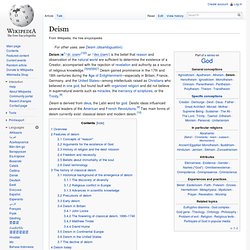
Deistic ideas influenced several leaders of the American and French Revolutions.[9] Two main forms of deism currently exist: classical deism and modern deism.[10] Overview[edit] Atheism. Atheism is, in a broad sense, the rejection of belief in the existence of deities.[1][2] In a narrower sense, atheism is specifically the position that there are no deities.[3][4][5] Most inclusively, atheism is the absence of belief that any deities exist.[4][5][6][7] Atheism is contrasted with theism,[8][9] which, in its most general form, is the belief that at least one deity exists.[9][10][11] The term "atheism" originated from the Greek ἄθεος (atheos), meaning "without god(s)", used as a pejorative term applied to those thought to reject the gods worshiped by the larger society.[12] With the spread of freethought, skeptical inquiry, and subsequent increase in criticism of religion, application of the term narrowed in scope.
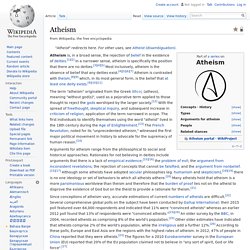
The first individuals to identify themselves using the word "atheist" lived in the 18th century during the Age of Enlightenment. Arguments for atheism range from the philosophical to social and historical approaches. Definitions and distinctions Range Concepts. Apatheism. Apatheism (/ˌæpəˈθiːɪzəm/ a portmanteau of apathy and theism/atheism), also known as pragmatic atheism or (critically) as practical atheism, is acting with apathy, disregard, or lack of interest towards belief or disbelief in a deity.
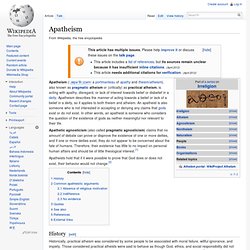
Apatheism describes the manner of acting towards a belief or lack of a belief in a deity, so it applies to both theism and atheism. An apatheist is also someone who is not interested in accepting or denying any claims that gods exist or do not exist. In other words, an apatheist is someone who considers the question of the existence of gods as neither meaningful nor relevant to their life. Apathetic agnosticism (also called pragmatic agnosticism) claims that no amount of debate can prove or disprove the existence of one or more deities, and if one or more deities exist, they do not appear to be concerned about the fate of humans. Therefore, their existence has little to no impact on personal human affairs and should be of little theological interest.[1] Agnosticism. Agnosticism is the view that the truth values of certain claims—especially claims about the existence or non-existence of any deity, as well as other religious and metaphysical claims—are unknown or unknowable.[1][2][3] According to the philosopher William L.
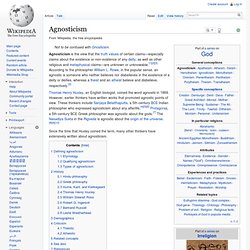
Rowe, in the popular sense, an agnostic is someone who neither believes nor disbelieves in the existence of a deity or deities, whereas a theist and an atheist believe and disbelieve, respectively.[2] Thomas Henry Huxley, an English biologist, coined the word agnostic in 1869. However, earlier thinkers have written works that promoted agnostic points of view. These thinkers include Sanjaya Belatthaputta, a 5th-century BCE Indian philosopher who expressed agnosticism about any afterlife,[4][5][6] Protagoras, a 5th-century BCE Greek philosopher was agnostic about the gods.[7] The Nasadiya Sukta in the Rigveda is agnostic about the origin of the universe.[8][9][10] Defining agnosticism[edit] Thomas Henry Huxley said:[11][12] Robert G.
Monotheism. Monotheism characterizes the traditions of Atenism, Babism, the Bahá'í Faith, Cao Dai (Caodaiism), Cheondoism (Cheondogyo), Christianity, Deism, Eckankar, Islam, Judaism, Rastafarianism, Ravidassia religion, Seicho no Ie, Shaivism, Sikhism, Tenrikyo (Tenriism), Vaishnavism, and Zoroastrianism and elements of the belief are discernible in numerous other religions.[4] Origin and development[edit] The word monotheism comes from the Greek μόνος (monos)[5] meaning "single" and θεός (theos)[6] meaning "god".[7] The English term was first used by Henry More (1614–1687).[8]
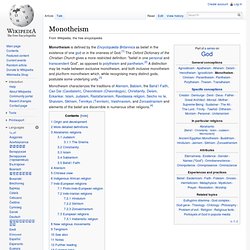
Polytheism. Polytheism is a religious construct and a type of theism.
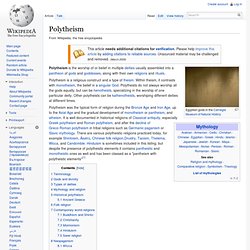
Within theism, it contrasts with monotheism, the belief in a singular God. Polytheists do not always worship all the gods equally, but can be henotheists, specializing in the worship of one particular deity. Other polytheists can be kathenotheists, worshiping different deities at different times.